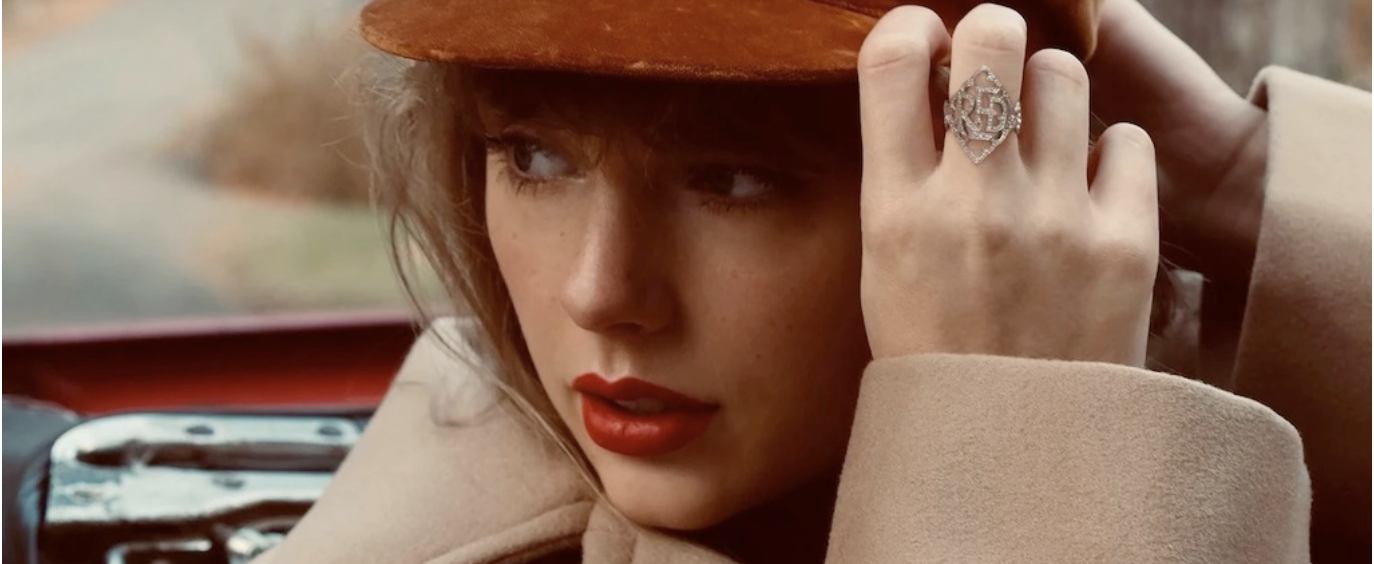Taylor Swift’s redesigned album art for upcoming re-release. Graphic from taylorswift.com.
REECE BUTLER | OPINION COLUMNIST | rmbutler@butler.edu
With worldwide phenomenon and award winning singer-songwriter Taylor Swift scheduling the release of her second re-recorded album “Red” on Nov. 19, Swifties across the globe are preparing for an autumn of nostalgia and good music. To get a better idea of what the Swifties of Butler University think about Swift’s remastered albums, I interviewed three on-campus Taylor Swift experts.
For first-year psychology and criminology major Caroline Blandford, the re-recordings are Swift’s way of reclaiming her professional autonomy.
“Taylor’s first six albums were made under a record label called Big Machine Records, which was bought by Scooter Braun in 2019,” Blandford said. “Taylor doesn’t own these albums.”
Junior elementary education major Abby Carpenter expanded on this idea and noted that while Swift’s re-recordings were ultimately to own the masters of her own music, there was an emotional motivation behind it.
“I think it’s all about taking ownership for all the hard work she’s done over her years,” Carpenter said.
With six albums’ worth of work belonging to someone else, it’s no wonder that Swift wants to reclaim her earlier work — especially when that work includes the countless memories and personal experiences that Swift is known for conveying through her songs.
And though each Swiftie said that they don’t believe artists owe their fans the amount of transparency that Swift has offered throughout this painful process of trying and failing to renown her original music, junior elementary education major Matthew Aspinwall pointed out the positive effects of Swift’s honesty in a notoriously predatory industry. Up-and-coming musicians like Olivia Rodrigo have even been quoted as saying that they checked their contracts for ownership rights especially because of Swift’s warnings.
“She’s… bringing some younger artists under her wing a little bit,” Aspinwall said. “Now artists are actually making money on these streaming services.”
Carpenter agreed, specifically arguing that Swift was likely not surrounded by stronger mentors during the beginning of career and — consequently — suffered for it.
“I think a lot of people are taken advantage of because of their talent,” Carpenter said. “She obviously made some naive decisions or decisions were made for her.”
With this perspective in mind, it’s no wonder that Swift continues to advocate for and mentor newer singers.
And yet, despite the millions of dollars she has lost to contractual oversights and the incalculable amount of hard work lost to greedy labels, the re-recordings are a cause for celebration. It’s clear throughout the internet that Swifties are eagerly awaiting the release of “Red” and every album to come. With her last re-recording debuting on the Billboard 200 and several small releases — including “Wildest Dreams” being dropped just a few days ago — garnering even more interest in Swift’s upcoming re-recordings, Swift has set herself up for future successes despite the previous hardships of her career.
Swift’s new work on re-recordings does, however, pose the question — when a singer is famous for the raw emotions she translates into her work, is anything lost by re-recording that work once she is already removed from the things that caused her to write it? Carpenter, who attended her first Taylor Swift concert during the “Red” era, said that the album will always hold a special place in her heart, and hearing Swift’s new versions at an older age may actually increase their relevance, as they have gained new meanings throughout her career.
While Carpenter emphasized the timeless quality of Swift’s stories, Aspinwall feels that some competition is inevitable as fans transition from the original versions to the new versions of Swift’s music.
“When there’s two versions of the song, you sort of pick your favorites,” said Aspinwall.
However, he also admitted that since Swift has matured as an artist, the quality of the music is objectively heightened by the re-recordings, allowing for a more professional take on her older songs.
“You respect that it’s just better music,” Aspinwall said.
Regardless of those changes, all three Butler Swifties are eagerly awaiting the re-recordings, particularly “All Too Well” — for Blandford and Carpenter— and “Treacherous”— for Aspinwall and Blandford.
Although Swift’s re-recordings are a source of excitement for her entire fanbase, they are also one of the few positive side effects of an infamously toxic industry. Swift’s battle to reclaim her own work has taken her time, money and energy in ways that fans can really only speculate about. And, unfortunately, this story only has a happy ending because of Swift’s incredible success — a level that few artists are able to attain.
So, what can we take away from this? Stand up for yourself. Regardless of your industry, the professional world thrives by taking advantage of inexperience, so protect yourself by prioritizing the results of your hard work.
Oh — and also stream “Red (Taylor’s Version)” on Nov. 19.



